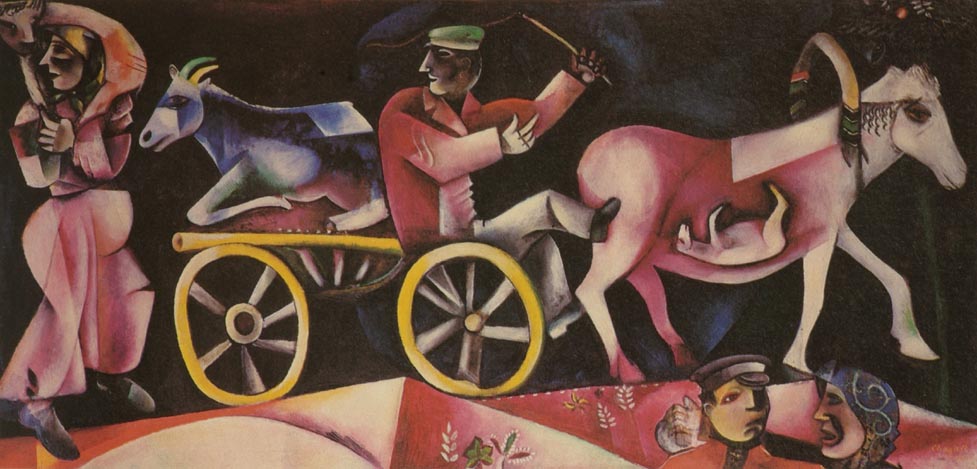
Marc Chagall, The Cattle Dealer, 1912
Oil on convas, 97x200.5cm Kunstmuseum, Basle
One day births the next
washing life's old canvas clean
I paint my new day
Haiku by Sue Thornton
Seventeenth Sunday in Ordinary Time A
July 24, 2011
Reading I: 1 Kings 3:5,7-12
Responsorial Psalm: 118
Reading II: Romans 8:28-30
Gospel: Matthew 13:44-52
Three short parables,
and you would have to wonder what is the point? Is it to say that
“God's World”(1) is a hidden treasure, a valuable pearl, good fish
kept while those that are no use are thrown into the blazing furnace?
I don't think so.
What is the key to the
first two parables?
“God's world is like a treasure hidden in a field which someone has found; they hide it again, go off happy, sell everything and buy the field.”
"God's world is like merchants searching for fine pearls; when they find one of great value they go and sell everything to buy it.”
Both scenarios are from the world of business, so the key must lie in the way business people react to a 'find', like a newly-discovered mineral deposit or a bargain on the Stock Exchange, a priceless masterpiece or a good buy at the cattle market. People in business are successful when they know how to take advantage of what comes their way. They will liquidate all their assets to plunge heavily on a promising opportunity; they will put all their resources into securing it. The risks they take are breathtaking to people who survive on daily wages. What is the human factor at work in this? Greed? Materialism? Vanity?
We need to take a closer look. Great human qualities are engaged here: the ability to make serious choices with far-reaching consequences, determination in pursuit of a chosen goal, the readiness to throw everything you've got into it, the ability to live with the risk - and, if you lose the lot, the ability to start over again from scratch.
So for Jesus, God's
World is there for the taking, but you need to take the risk and put
your last dollar into it.
Last week Melbourne mourned the death of
Allan (Yabby) Jeans, one of the greatest of coaches in the Australian Football League. Some
remarkable tributes were published (my source is The Age), dotted with some memorable Yabbyisms :
Suppose for a moment that Jesus might have been at least as good a coach as Yabby, had he taken an interest in the game. We might consider these two short parables as part of his bag of tricks. Think of them being spoken as a coach might speak them: “...he went and sold everything he had and bought it. He took the risk. He put his last dollar on it. He paid the price. He was ready to pay the price.”
I think Jesus was more than a rabbi, more than a wise man sharing his insights, more than a motivational speaker: he was also an inspirational coach who fired his disciples with vision, enthusiasm and - love.
Just a word about the other parable: the threats tacked onto the end are, I suspect, not part of the original but a later addition, as we noticed already in the parable of the wheat and weeds. Again they shift the focus and confuse the message.Take those lines out, and we are left with the very ordinary picture of fishermen sorting their catch, something they do every morning, after hours of work out on the lake casting their net this way and that, hauling it in to spill the catch into the boat, only to try again on the other side. Remember Peter's answer to Jesus on another occasion: "Master, we've worked all night and caught nothing...".
Now they have more work to do, sorting the catch. The good fish they keep, the
useless ones are just thrown away. There is nothing wrong with them - there's just no market for them: useless. On a good day there will be plenty of good fish for the market, but on an average day the useless ones might well outnumber the good ones.That's the risk you take every morning you launch the boat onto the fog-shrouded water in the dark, hours before sunrise.
And finally, the last word on parables and interpreting them:
(1) Last week I said I was going to adopt this expression "God's World" as a translation of "Kingdom of Heaven".